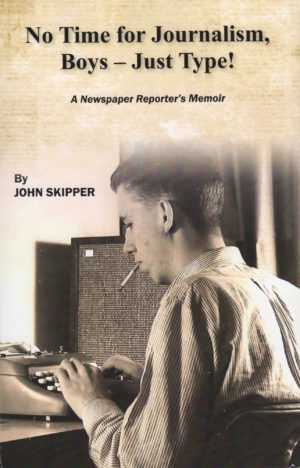
By Michael Swanger
To know John Skipper is to believe every word of the opening paragraph of his latest book, “No Time for Journalism, Boys — Just Type! A Newspaper Reporter’s Memoir.”
 “Despite what you might think, this wasn’t supposed to be an autobiography or a memoir,” he writes. “This isn’t intended to be about me. In fact, it is unfortunate that so much of me is contained in the following pages but it is the only way I know to tell the story I want to tell, the story of newspapering.”
“Despite what you might think, this wasn’t supposed to be an autobiography or a memoir,” he writes. “This isn’t intended to be about me. In fact, it is unfortunate that so much of me is contained in the following pages but it is the only way I know to tell the story I want to tell, the story of newspapering.”
Skipper, who has written several stories for Iowa History Journal over the years, is a dyed-in-the-wool professional newspaperman who understands that the story, not the storyteller, is the focus of a reporter’s work.
Shortly after retiring in 2018 from a 53-year career as an editor, reporter and columnist for newspapers in Illinois, Louisiana and Iowa, including the Council Bluffs Daily Nonpareil and Mason City’s Globe Gazette, Skipper began writing about his professional experiences while sitting bedside with his terminally-ill wife, Sandra. His writings were initially intended to be a personal gift to her and their three adult daughters, “who may have wondered when they were growing up what Dad was doing all those years, working long days, nights, weekends, always being on call and not making very much money.”
Sadly, Sandra did not live to see the culmination of his bedside work, though Skipper writes that her “influence is spread all over it.”
Fortunately, his daughters and the rest of us are privy to a behind-the-scenes look at Skipper’s career that also tells a much larger story in that it serves as an ode to newspapers and the vital roles they play in the communities they serve.
“Fifty years ago, newspapers were an indispensable part of American life,” Skipper writes. “To go without a newspaper was like shutting a window to the rest of the world.”
Reading “No Time for Journalism, Boys — Just Type!” is like opening a window to see how newspapers in Kankakee, Ill., Alexandria, La., Council Bluffs and Mason City have the same roles to play as the New York Times or the Washington Post, they are just played on a smaller stage. It also illuminates how community newspaper reporters — unlike their big city brethren — do the yeoman’s work of covering everything under the sun and moon with little recognition or monetary reward.
“One of the things that motivated me to get out of bed in the morning for 52 years and head to the office was knowing that one story on any given day can make a difference, and maybe today will be that day,” Skipper writes.
Reporters who have worked for small newspapers will admire Skipper’s decades-long devotion to the job’s varied and grinding workload, as will anyone who has navigated a career for more than 50 years. From writing obituaries, compiling the results of county fair livestock competitions and monitoring the police and fire scanner on nights and weekends should breaking news occur, to exposing crooked politicians and interviewing war heroes, local celebrities and Nobel Peace Prize winners, the range of work is expansive and equally important. All of it must be completed with accuracy and integrity when your byline is on the line and deadline looms. Chapters about objectivity, deadlines and the proverbial “unavailable for comment” are also enlightening and entertaining.
Skipper devotes several chapters to the years he spent covering politics. They include memories of reporting on the Iowa caucuses and interviewing presidential candidates for the Globe Gazette, such as the Bushes, Bill Clinton, Barack Obama and Donald Trump. He also shares his thoughts about the role a newspaper should play in covering politics in the candidly titled chapter “The Folly of Newspaper Endorsements.”
Along the way, Skipper doesn’t shy away from sharing the mistakes he made, the lessons that he learned and the value of maintaining a sense of humor to help defuse the job’s pressures. The title of the book is your first clue regarding the latter.
Not so funny, however, is the fact that during the last 20 years or so, many newspapers have seen their circulations and page counts shrink thanks in part to free online content and social media.
“With the electronic age upon us, where many Americans are getting their ‘news’ from anyone who has an idle thought or an ax to grind, where opinion, gossip and rumor-mongering on social media fulfill many people’s appetite for information, the impact of the daily newspaper is slipping away,” writes Skipper.
Lest anyone need a reminder of the value of community newspapers and how they are a basis for our democracy, our humanity and our shared sense of community, I recommend that you add Skipper’s terrific tome to your reading list.
TO READ MORE FASCINATING STORIES ABOUT IOWA HISTORY, subscribe to Iowa History Journal. You can also purchase back issues at the store.
